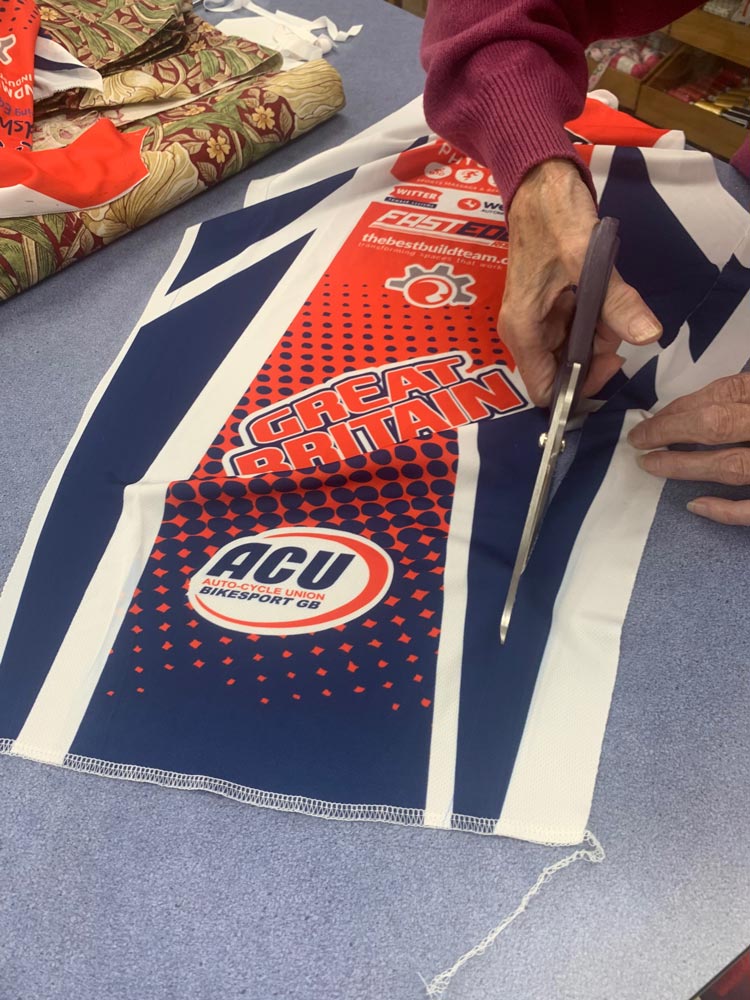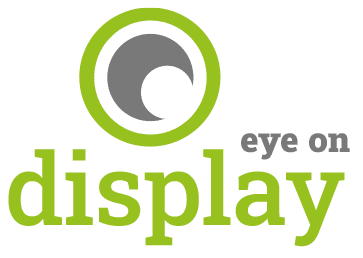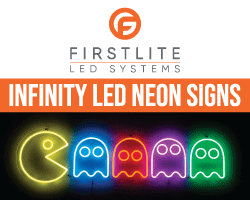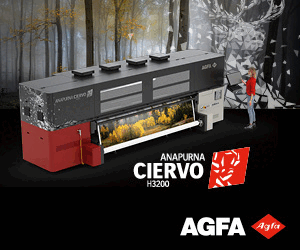Company adopts in-house reshoring practices for the printing and production of short run sportswear

Telford-based TF Signs has installed an Epson SureColor SC-F6300 (hdK) dye-sublimation printer from CMYUK. Together with a platen heat press, it was purchased initially to aid the production of team apparel for the British male and female teams competing at this year’s FIM International Six Days Enduro (ISDE), regarded as one of the world’s most prestigious off-road motorcycle competitions.
Ryan Austin, MD of Austin Mix Limited, the parent company of TF Signs, has been involved in the sign and graphics industry for over 25 years. During this time, he has blended his love of motorsports into his day job, providing all printed items and clothing such as motocross jerseys, bespoke team apparel, event logistics, and brand awareness for Team GB events.
Following a curtailment in 2020 due to the pandemic and a reduced presence in 2021, the ISDE made a spectacular comeback this year for its 70th anniversary, pushing Ryan into bringing the manufacturing of these event jerseys in-house for the first time and setting him on the reshoring path.
“After the cancellation in 2020 and the uncertainty surrounding the 2021 event, the companies we previously partnered with seemed disinterested in the project we had this year. With Brexit and the Covid excuse, the usual sources in Italy became unusable due to the long lead times required on design and production and the tax tariffs imposed by Brexit. In June, I took the decision we needed to manufacture here in the UK to enable us to solve the above problems, giving us 100 per cent control over every aspect of the garment production,” says Ryan.
“Nobody is manufacturing such items in the UK for this market space, previously, it was all outsourced to companies in Italy, and while the garment costs are competitive, the customs bills are proving very high due to Brexit. My thinking was to install a dye-sublimation printer to enable me to produce garments at roughly the same production costs but without the long lead times and logistic issues which continue to be problematic.
“To be honest, it had always been something I’ve wanted to do because outsourcing had problems of time constraints. It’s not like the Olympics, for example, where you’re producing X number of small, medium, and large shirts that the athletes choose. Each of these jerseys is a bespoke individual garment that displays a different name, number, and sponsor. Because of certain contractual obligations, some logos need to be placed in specific areas to be prominent during media coverage. Due to the nature of these types of events, competitors might be injured and unable to compete on short notice, in which case you’ve got to generate new artwork for the replacement. With outsourcing, this had proved frustrating in previous years,” he adds.

Ryan’s Reshoring requirements
Once he’d decided to take the Reshoring plunge, Ryan knew he wanted to invest in Epson dye sublimation technology, but his main concern was the pressing element of the process. “How could I do that part of the process on a scale where I didn’t require a big and expensive calendar press? After a conversation of pure coincidence, a suitable pattern press was acquired.
The printer Ryan had selected was an Epson SureColor SC-F6300 (hdK) bought from CMYUK, the only UK supplier that had stock of the printer at the time. “It turned out to be really hard sourcing one. I’m based in Telford and often pass CMYUK’s showroom facility in Shrewsbury. I phoned them on the off-chance, and it so happened they had stock. “I went in on the Thursday to view the printer, paid for it on the Friday, and had it delivered and installed Monday. They were great,” he says.
The SureColor SC-F6300 (hdK) is a dedicated roll-to-roll dye sublimation printer that has a max width of 44 inches (1118mm) and a maximum print resolution of up to 1400 dpi. Developed specifically for textile producers, it is designed to get businesses up and running as quickly as possible.
“It’s a nice size because you can print everything you need and scale up as much as you want. For the ISDE job, we manufactured nearly 100 garments consisting of a four-piece pattern. For this, we had to create a pattern that was easy to stitch together and could work on the printer and be printable to a tight deadline. This pattern was designed along with the fabric tested for application prior to the machine being delivered, so we were ready for production to commence the day it was installed.
“For me, one of the most daunting things was colour and how I could manage colour in a reasonably straightforward way that doesn’t involve messing about with lots of different processes, such as file types or settings, to be able to create consistent colour output. From the get-go, there wasn’t much that I needed to do to get the right colour consistency. We printed over 300 metres of pattern with zero waste. It lived up to its plug-and-play credentials. Plug it in, prime it up, play about with a couple of the settings, and you just go from there.
“Obviously, I’ve been in the industry space for some time and have a good understanding of what needs to be done to get the best colours, but if you didn’t have any understanding of that, this printer is nice and simple to use, it’s easy to RIP and set files up very quickly,” says Ryan.

Heat press for Reshoring on-demand activities
While the printer was up and running straight away, Ryan experienced some initial problems with the Adkins platen press, which he bought elsewhere second-hand. “I ended up having to service the heat press. The owners before had used it for many things, so I gave the platen underneath a really good clean, and after that, it was perfect. It’s a great piece of kit for me now, but ultimately if I were doing this volume of work every month, I’d need a different set-up,” he says.
In addition to the whole range of Epson dye sublimation printers, CMYUK was also a supplier of Adkins heat presses until the manufacturer’s recent closure. Understanding the growing demand in the market for small companies and creative entrepreneurs to produce small runs in sportswear, fashion, apparel, soft furnishings, and décor, CMYUK now offers the Vertex, a new hybrid transfer printing calendar from Klieverik. This is an affordable heat press with a compact footprint that handles both single pieces and roll-to-roll fabrics.
For a month, Ryan focussed on delivering the garments for the ISDE event. “We used everything that was output from the Epson printer as it was 100 per cent consistent. I didn’t purchase the take-up roll for the printer, but I can see that I’ll end up getting one as we continue,” says Ryan.
TF Signs is traditionally a general signage and display printer. While it offers workwear and embroidery services, Ryan is very keen to expand the new in-house garment printing and manufacture. “My market is sportswear, including polyester T-shirts, polo shirts, zip hoodies, gilets, and long-sleeved race jerseys,” he says.
If ever there was a sign to endorse Ryan’s new business extension, both the GB Men and Women’s teams took the top spot at the ISDE championship this year for the first time since 1953, victorious in their digitally printed and UK-manufactured sports attire.















